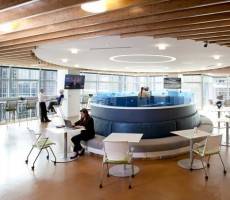October 15, 2014
Awareness of benefits of BIM growing in US and UK, but implementation lags
 Building owners on both sides of the Atlantic are increasingly aware of the benefits of Building Information Modelling (BIM), even though they may not yet use it directly, according to a new report published by McGraw Hill Construction in partnership with Autodesk and Skanska. The report, The Business Value of BIM for Owners, suggests that this pent-up demand will be unleashed in the near future with 40 percent of US owners and 38 percent of UK owners predicting that more than 75 percent of their projects will involve BIM in just two years, with a particularly high level of growth in the US. Growth in the UK is being driven by the approaching implementation of a central government mandate requiring use of BIM on all national public projects by 2016, with over two thirds (67 percent) of UK owners reporting that the mandate is already having a high impact on their use of BIM. Owners in the UK are also more generally aware of the benefits of BIM and have more experience of it in practice.
Building owners on both sides of the Atlantic are increasingly aware of the benefits of Building Information Modelling (BIM), even though they may not yet use it directly, according to a new report published by McGraw Hill Construction in partnership with Autodesk and Skanska. The report, The Business Value of BIM for Owners, suggests that this pent-up demand will be unleashed in the near future with 40 percent of US owners and 38 percent of UK owners predicting that more than 75 percent of their projects will involve BIM in just two years, with a particularly high level of growth in the US. Growth in the UK is being driven by the approaching implementation of a central government mandate requiring use of BIM on all national public projects by 2016, with over two thirds (67 percent) of UK owners reporting that the mandate is already having a high impact on their use of BIM. Owners in the UK are also more generally aware of the benefits of BIM and have more experience of it in practice.
























October 16, 2014
Americans would still prefer a male boss to a female boss
by Sara Bean • Comment, News, Workplace